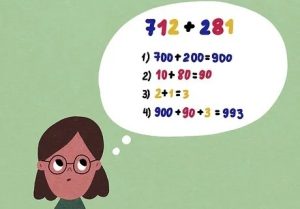WHAT IS MENTAL MATHS?
Mental maths is a technique of performing mathematical calculations in your head, without the use of a calculator or pen and paper. It involves developing mental strategies for performing arithmetic calculations quickly and accurately.

Benefits of mental maths:-
- Benefits of mental math: Mental maths not only helps improve your calculation speed but also enhances your brain function and cognitive abilities. It helps develop problem-solving skills, logical reasoning, and memory.
- Techniques for mental math: There are several mental maths techniques, such as Vedic math, abacus, and soroban. These techniques involve breaking down complex calculations into smaller and simpler ones, using patterns and shortcuts, and applying logical reasoning to arrive at the correct answer quickly.
- Practicing mental maths: Regular practice is crucial for improving mental math skills. Start with simple calculations and gradually move on to more complex ones. Practice mental math techniques regularly to make them second nature.
- Integration into education: Mental math can be integrated into education at an early age to help children develop these skills. Teachers can incorporate mental math exercises into their lessons to help students improve their mental arithmetic abilities.
- Use in daily life: Mental maths can be used in everyday life for calculating tips, discounts, and bills. It can also be useful in professions that require quick and accurate calculations, such as accounting, finance, and engineering.
- Importance of speed and accuracy: Mental math is not just about performing calculations in your head, but also about doing it quickly and accurately. It’s important to develop both speed and accuracy to excel in mental math.
- Breaking down problems: One of the key strategies in mental math is to break down complex problems into smaller and simpler ones. For example, breaking down a multiplication problem into simpler multiplication or addition problems.
- Visualization techniques: Visualization techniques can help in mental math, such as visualizing numbers and mathematical operations in your mind, using your fingers to visualize numbers, and using diagrams or drawings to represent problems.
- Memory techniques: Memory techniques can also be helpful in mental math, such as using mnemonic devices to remember formulas and patterns, or creating mental images to help remember numbers and calculations.
- Applications in competitive exams: Mental maths is an essential skill in many competitive exams, such as aptitude tests, entrance exams, and standardized tests. Developing mental maths skills can help students perform better in these exams.
